B.V. Lawson's Blog, page 241
July 26, 2012
Mystery Melange
It's with great sadness I have to report that another indie bookstore is closing. Mysteries to Die For in Thousand Oaks, California held a farewell party last night with Edgar nominee Timothy Hallinan discussing and signing The Fear Artist, the newest thriller set in Bangkok featuring Poke Rafferty. The last day of business or the bookstore will be Saturday, July 28.
The Fifth Witness by Michael Connelly won the second annual Harper Lee Prize for Legal Fiction, from the University of Alabama School of Law and the ABA Journal. The award honors the work of fiction that best exemplifies the role of lawyers in society.
The Sisters in Crime Australia organization released the longlists for the group's annual Davitt Awards for crime fiction, in the categories of Adult Crime Fiction, Children’s/Young Adult, and True Crime.
The pulp of the week over at Beat to a Pulp is Patti Abbott's "How to Stay Ahead." Hop on over and check it out.
Mystery Writers of America has added two MWA Universities later this year, one in Denver on August 11th and another in Charlotte on October 27th. These all-day writing seminars focus on a core curriculum of topics such as After the idea; Dramatic structure and plot; Setting and description; Character; Editing; and The writing life.
Five international bestselling crime fiction authors will appear at this year's CSI Portsmouth in November as part of Portsmouth BookFest in the UK. Stephen Booth, Ann Cleeves, Roger Ellory, Matt Hilton and Pauline Rowson will join experts from Hampshire Police and Portsmouth University to discuss crime fiction and fact on Saturday 3 November at this third annual event.
The Left Coast Crime Conference has already announced their plans for 2014, so if you didn't make this year and can't swing next year's event in Colorado Springs, then put March 20-23, 2014 in Monterey, California on your calendar and start saving now. The U.S. Guest of Honor is Cara Black, International Guest of Honor is Louise Penny, Toastmaster is Brad Parks and Fan Guest of Honor is Sue Trowbridge.





July 23, 2012
Pulp Ink Part Deux
Hard-working Chris Rhatigan, editor of the ezine All Due Respect and author of the story collection Watch You Drown, teamed up with the equally hard-working writer Nigel Bird (who just released his novel In Loco Parentis) to create and edit the anthology Pulp Ink. The stories were all inspired by the movie Pulp Fiction and written by 24 of the best short crime fiction authors working today. It proved so successful, Rhatigan and Bird decided to follow it up with a sequel.
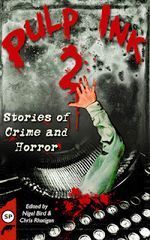 Pulp Ink 2, freshly-baked by Snubnose Press, features a mixture of crime and horror, a la "beautiful killers, visions of the apocalypse, blood-thirsty rats, and one severed arm on a quest for revenge. No half-assed reboots here, just some of the finest writing in crime and horror today." I'm proud to be included with the likes of Patti Abbott, Heath Lowrance, Kevin Brown, Mike Miner, Eric Beetner, Matthew C. Funk, Richard Godwin, Cindy Rosmus, Christopher Black, Andrez Bergen, James Everington, W. D. County, Julia Madeleine, Kieran Shea, Joe Clifford, Katherine Tomlinson, R. Thomas Brown and Court Merrigan.
Pulp Ink 2, freshly-baked by Snubnose Press, features a mixture of crime and horror, a la "beautiful killers, visions of the apocalypse, blood-thirsty rats, and one severed arm on a quest for revenge. No half-assed reboots here, just some of the finest writing in crime and horror today." I'm proud to be included with the likes of Patti Abbott, Heath Lowrance, Kevin Brown, Mike Miner, Eric Beetner, Matthew C. Funk, Richard Godwin, Cindy Rosmus, Christopher Black, Andrez Bergen, James Everington, W. D. County, Julia Madeleine, Kieran Shea, Joe Clifford, Katherine Tomlinson, R. Thomas Brown and Court Merrigan.
Proceeds go to support the charity PLACE2BE, a school-based counselling service for kids. As Nigel Bird says in his intro: "A full year of weekly counselling sessions are offered within a therapeutic environment. As relationships are built, so is confidence and self-esteem. Families and teaching staff are included in the support so that progress can be continued outside of the therapy room."
Pulp Ink is available in print form from Amazon and various digital formats via Smashwords, Amazon and B&N Nook Books. Go grab a copy and settle down with some fun horro-crime. But you might want to leave the lights on.





July 22, 2012
Media Murder for Monday
 MOVIES
MOVIES
Matthew McConaughey all but confirmed a sequel to The Lincoln Lawyer, and hopes to reprise his role as attorney Mickey Haller. The film would combine two of Michael Connelly's novels and see Bryan Cranston's character play "a significantly larger role," according to DigitalSpy.
Peter Craig (co-writer for The Town) has been tapped to pen the screenplay for The Ghostman. The story centers on a man whose job it is to clean up problems and assist fugitives in disappearing. Then, he's dragged into a casino heist gone bad and only two days to fix the situation before a ruthless kingpin kills the "ghostman's" mentor.
Kenneth Branagh is not only directing the Jack Ryan movie reboot starring Chris Pine, he's in talks to star in the film playing villain Viktor Stazov, who creates a plot to destroy the US economy with the help of the Russian government.
The cast for the gangster movie Malavita has expanded to include Robert De Niro, Michelle Pfeiffer, Tommy Lee Jones, Dianna Agron and John D'Leo. The comic drama follows a group of gangsters who are relocated to France under witness protection.
TV
The Emmy nominees for excellence in U.S. television programming were announced last week. The contenders for Best Drama Series include Boardwalk Empire, Breaking Bad, Downton Abbey, Game of Thrones, Homeland and Mad Men. Sherlock: A Scandal in Belgravia was nominated for Outstanding Miniseries or Movie and both Benedict Cumberbatch and Martin Freeman were nominated for that episode, as well. Omnimystery News highlighted the nominees from the crime dramas.
Production begins next week on the first French production of a television crime drama filmed entirely in English. The project, titled Jo, will be an eight-episode series featuring Jean Reno as police detective Joachim "Jo" Legrand, with each episode centering on a different iconic Paris landmark as Jo investigates mysterious murder cases. Edgar Award-winning screenwriter René Balcer created the series for Atlantique Production. (Hat tip to Omnimystery News.)
The series Unforgettable may have gotten a reprieve, with CBS first axing and then renewing the cop procedural, but three of its stars apparently aren't so lucky. Cast members Michael Gaston (Det. Mike Costello), Kevin Rankin (Det. Roe Saunders) and Daya Vaidya (Det. Nina Inara) will not return as series regulars when the show returns in in summer 2013.
Star Trek writers Alex Kurtzman and Roberto Orci are pitching a TV show based on the classic supernatural story "The Legend of Sleepy Hollow" by 19th-century author Washington Irving. The series would be set in the modern day, with Ichabod Crane partnering with Sleepy Hollow's female sheriff to solve mysterious happenings in town. Meanwhile, a competing project also based on the Sleepy Hollow story is being pitched to the CW network by Missing writers Grant Scharbo and Patrick Macmanus.
Former Criminal Minds star Paget Brewster will star in the upcoming season 14 opener of Law & Order: SVU. She'll play the head of the Public Integrity Unit at the District Attorney's office, dealing with the case against Captain Cragen (Dann Florek) under suspicion of murder after he woke up by the side of a dead woman in last season's finale. Several former SVU guest stars will also return for the episode.
PODCASTS
NPR's summer Crime in the City feature kicks off with author Bruce DeSilva, who says Providence, Rhode Island is the perfect place to set his crime fiction.
NPR also featured a rebroadcast of a 2007 interview with author Michael Connelly, as he takes a reporter on a tour of Los Angeles sites where he sets his Harry Bosch series.





July 20, 2012
Friday's "Forgotten" Books - Maigret Sets a Trap
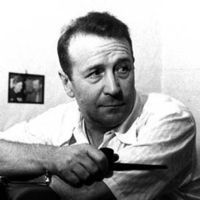 Today, as part of Patti Abbott's weekly Forgotten Books feature, it's a special tribute to the Belgian-French author Georges Simenon (1903–1989). I must admit that every time I read of Simenon's prolific literary output, I am both amazed and envious. He published around 200 novels, 150 novellas, several nonfiction books and articles and an almost countless number of pulp novels written under more than two dozen pseudonyms. It's been said he churned out 60 to 80 pages a day (which in English would be equivalent to roughly 15,000 to 20,000 words).
Today, as part of Patti Abbott's weekly Forgotten Books feature, it's a special tribute to the Belgian-French author Georges Simenon (1903–1989). I must admit that every time I read of Simenon's prolific literary output, I am both amazed and envious. He published around 200 novels, 150 novellas, several nonfiction books and articles and an almost countless number of pulp novels written under more than two dozen pseudonyms. It's been said he churned out 60 to 80 pages a day (which in English would be equivalent to roughly 15,000 to 20,000 words).
Although his standalone psychological suspense novels are probably his best and most-highly reviewed works, it's his series featuring Inspector Jules Maigret, commissioner of the Paris Brigade Criminelle, for which Simenon is best remembered. Maigret is a heavy drinking, pipe smoking stocky man of average height whose laid-back sleuthing style relies more on pure intuition than traditional police leg work. The character has been the subject of several TV adaptations, such as the ITV series titled simply, Maigret. Simenon's 1955 novel Maigret Sets a Trap (Maigret tend un piège) was turned into an episode of the ITV show in 1992 starring Michael Gambon, following an earlier film version (1958) with Jean Gabin in the title role, which won the Edgar Award and was nominated for 3 BAFTA Film Awards.
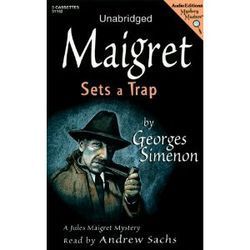 It's the middle of a hot and steamy summer in Paris, and the Parisians are terrified. A Jack the Ripper-style serial killer has evaded police for five months, stabbing and murdering a woman each month, all with similar physical descriptions and all killed in the same Montmarte neighborhood. Dubbed "The Montmartre Maniac" by the newspapers, the psychopathic villain seems to be smugly taunting the police, who have no clues. Under pressure from the public, Maigret takes the advice of a famous psychologist and uses the journalists' obsession with the case to devise an elaborate trap to play on the killer's ego and trick him into making a mistake.
It's the middle of a hot and steamy summer in Paris, and the Parisians are terrified. A Jack the Ripper-style serial killer has evaded police for five months, stabbing and murdering a woman each month, all with similar physical descriptions and all killed in the same Montmarte neighborhood. Dubbed "The Montmartre Maniac" by the newspapers, the psychopathic villain seems to be smugly taunting the police, who have no clues. Under pressure from the public, Maigret takes the advice of a famous psychologist and uses the journalists' obsession with the case to devise an elaborate trap to play on the killer's ego and trick him into making a mistake.
Maigret dangles policewomen with the same physical characteristics as the previous victims as bait in the Montmarte target zone, including young rookie Marthe Jusserand, a newly-minted member of Maigret's team. The plan seems to have failed at first, but during the villain's escape, Jusserand manages to get the suspect's description and grab one of his buttons and a piece of cloth from his jacket. The man is tracked and arrested, case seemingly closed—until another victim is killed while the suspect is still in jail. Maigret has a slight crisis of conscience, wondering if they've nabbed an innocent man, but then he sets a second trap and reveals the killer in a dramatic twist.
A bit of interesting trivia: Inspector Maigret was allegedly based on a real-life French policeman named Charles Chevenier. For a bit of added fun, the Simenon tribute site Trussel.com has photos and a Google map of the murder locations mentioned in Maigret Sets a Trap.





July 18, 2012
Mystery Melange
Poisoned Pen Press announced the winner of the first Discover Mystery prize, Ronald Sharp, who was awarded a $1000 cash prize and a publishing contract with plans to release Sharp's No Regrets, No Remorse in the fall. Judge and novelist Dana Stabenow, said of the winning title, “A Harley-riding hit woman who kills for virtue as well as profit and a Miami lawyer turned sculptor combine forces to butt heads with crooked lawyers, organized crime, and local authorities to track down a murderer. Ronald Sharp had me from the first chapter, a step-by-step account of how to blow up a house, with the bad guy safely inside, of course." Finalsts included Bill Butler, Dawn Marie Fichera, Susan Lumenello and Bruce Rolfe.
The Q&A roundup includes a Wall Street Journal interview with Mark Billingham, who lets his hair down with insights on what he does in his spare time; and award-winning artist and writer Darwyn Cooke chatted with CNN about re-imagining Parker, Donald Westlake's pulp fiction anti-hero, in a series of graphic novels.
Winners of Strand Critics Awards were announced last week. The editors of Strand magazine handed out awards for Best First Novel to Sister by Rosamund Lupton; Best Novel (a rare three-way tie) to The Drop by Michael Connelly, Buried Secrets by Joseph Finder, and The Cut by George Pelecanos. Lifetime Achievement awards went to Joseph Wambaugh and John Sandford
The International Thriller Writers also handed out awards at the annual Thrillfest in New York City. Best Hardcover Novel was Stephen King's 11/22/63; Best First Novel: Spiral by Paul McEuen; Best Paperback Original: The Last Minute by Jeff Abbott; Best Short Story: "Half-Lives" by Tim L. Williams (Ellery Queen Mystery Magazine).
This week saw the passing of Donald J. Sobol, best known for his popular "Encyclopedia Brown" detective series of children's books, who died at the age of 87. Sobol's series featuring amateur boy detective Leroy "Encyclopedia" Brown began in 1963 with the brainy young whiz solving about 10 different short mysteries in each book. Encyclopedia Brown books have been translated into 12 languages and were turned into a TV series in 1989. (Hat tip to Mystery Fanfare.)





July 16, 2012
Author R&R with Joy Castro
 Joy Castro's short fiction, poetry, and creative nonfiction has appeared in several anthologies and journals, and she was named one of 2009's Best New Latino Authors by LatinoStories.com. Her Truth Book: A Memoir was named a Book Sense Notable Book by the American Booksellers Association and excerpted in The New York Times Magazine. Joy's new debut novel, Hell or High Water, from Thomas Dunne Books, is celebrating its book launch today with the start of a blog tour.
Joy Castro's short fiction, poetry, and creative nonfiction has appeared in several anthologies and journals, and she was named one of 2009's Best New Latino Authors by LatinoStories.com. Her Truth Book: A Memoir was named a Book Sense Notable Book by the American Booksellers Association and excerpted in The New York Times Magazine. Joy's new debut novel, Hell or High Water, from Thomas Dunne Books, is celebrating its book launch today with the start of a blog tour.
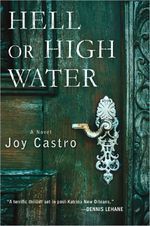 Set in post-Katrina New Orleans, Hell or High Water features young, ambitious Cuban American reporter Nola Céspedes as she tracks registered sex offenders who went off the grid during the Hurricane Katrina evacuation. Nola tries to balance her investigation with taking care of her aging mother, mentoring a teenager, and meeting a mysterious stranger named Bento. But Nola is gradually drawn into an underworld of violent predators that she struggles to keep separate from her middle-class professional life. Raised in poverty by a single mother in New Orleans' notorious Desire Projects, Nola has her own secrets to hide.
Set in post-Katrina New Orleans, Hell or High Water features young, ambitious Cuban American reporter Nola Céspedes as she tracks registered sex offenders who went off the grid during the Hurricane Katrina evacuation. Nola tries to balance her investigation with taking care of her aging mother, mentoring a teenager, and meeting a mysterious stranger named Bento. But Nola is gradually drawn into an underworld of violent predators that she struggles to keep separate from her middle-class professional life. Raised in poverty by a single mother in New Orleans' notorious Desire Projects, Nola has her own secrets to hide.
Joy stopped by In Reference to Murder for a little "Author R&R (Reference and Research)" to offer up some of the research she undertook in writing this book:
Novelists sometimes feel comfortable drawing upon only their experience and imagination to write their books, but for my debut thriller Hell or High Water, in which a young tourist is abducted from the French Quarter in post-Katrina New Orleans, research was essential.
Although I’d been traveling regularly to New Orleans for many years before I set a mystery there, I found that I still needed to learn a great deal. Because my husband grew up on the north shore of Lake Pontchartrain and later lived, worked, and graduated from college in New Orleans—and because we always stayed with his family when we visited—I’d had the good fortune of seeing a version of New Orleans that went well beyond the French Quarter’s particular charms. But I still had a lot to learn.
Though the novel is set in 2008, I wanted to integrate into the story some of the city’s rich, complicated history, including its colonial rulers, France and Spain, and some of the colorful characters from its past. Library research helped me with this aspect, as did visiting the historic Cabildo, part of the Louisiana State Museum complex in New Orleans. I’m particularly grateful to Ned Sublette’s excellent book The World That Made New Orleans: From Spanish Silver to Congo Square, which is thorough and beautifully written. I was able to include relevant, illuminating details about the French settlement of the city, early convent girls, the Baroness de Pontalba, and more.
Hell or High Water is set almost three years after Katrina, during the long aftermath of disaster, and Katrina still looms large in the memories of the characters. I was not in New Orleans during the hurricane; my in-laws came and stayed with us, and we obsessively watched, read, and listened to news reports about the storm. For heartbreaking accounts of the human impact, I read and reread Chris Rose’s Times-Picayune columns, which are collected in his wrenching book 1 Dead in Attic and which I highly recommend. Visiting New Orleans afterward, I interviewed a friend who’d returned to the city immediately after the evacuation, and details from his eyewitness account of that strange time—hot, silent, lawless—are integrated into the novel.
Other books helped me put the hurricane into a larger environmental and political context. Bento, a key character in Hell or High Water, is a coastal geomorphologist at the University of New Orleans, and my efforts to make his character believable, knowledgeable, and realistic were helped by books such as Douglas Brinkley’s The Great Deluge: Hurricane Katrina, New Orleans, and the Mississippi Gulf Coast and Mike Tidwell’s The Ravaging Tide: Strange Weather, Future Katrinas, and the Coming Death of America’s Coastal Cities. Bento’s urgency around restoring Louisiana’s coastal wetlands is based on the real concerns of scientists.
The main plot of Hell or High Water, though, concerns protagonist Nola Céspedes, a reporter at the Times-Picayune who is assigned a story about the hundreds of registered sex offenders who went off the grid during the hurricane evacuation and had not, by 2008, been relocated. At the same time, a female college student has been abducted from the French Quarter. Nola’s pursuit of both cases leads her into increasingly dangerous corners of the struggling city.
To give Nola’s interviews with sex criminals and psychiatric professionals the ring of accuracy, I did library research—with the help of some wonderful reference librarians—about sexual predators: the psychology of sex criminals, criminal sentencing, rehabilitation methods, and rates of recidivism. Library research also helped me describe the long-term effects of sexual assault, as well as the therapeutic methods used to help the victims. All of the information and statistics in the novel about these issues are based on recent published scholarship.
To be able to describe accurately Nola’s workplace in the Times-Picayune offices, my husband and I took a tour of the building—with a bunch of grade-school kids! That was fun. They asked all kinds of crazy questions as they were being herded through, and we just kind of tagged along. Seeing the actual presses on which the physical newspapers are manufactured was incredible. They’re gigantic. Getting a sense of the spatial relationships in the building helped me to visualize and describe Nola’s time at work more accurately. For help with the professional life of Nola’s friend Calinda, who works at the DA’s, I interviewed my sister-in-law, a Louisiana attorney and fantastic storyteller.
My own background is not Catholic, but Catholicism is tremendously important in New Orleans, and Nola, her mother, and her friends Soline and Fabi are Catholic. I did religious research about Catholicism, and since Nola’s mother immigrated from Cuba, the research included learning the various versions of the origin story of the Virgen de la Caridad del Cobre, Cuba’s Virgin Mary, which I’d known about vaguely due to my own Cuban background but had never studied in any sort of thoroughgoing way. I also visited the two Catholic churches in New Orleans that are important settings in the novel, the St. Louis Cathedral in Jackson Square and Our Lady of the Rosary Church on Esplanade Avenue. In writing, though, I still made errors, and my Catholic friends were kind enough to point them out when they read the manuscript.
Because Nola and her mother are Cuban American, I also researched Santería, the syncretic Caribbean religion that mixes elements of Catholicism with Yoruba religion. If you’re familiar with Santería, you’ll notice that some of the key characters in the book are marked by colors and traits characteristic of Santería’s orishas, or deities. The bath that Nola takes on pages 315-317—for courage, strength, and protection—comes from a Santería recipe.
I was in the very early stages of drafting when I first heard about the French Canadian legend of the loup garou—half-man, half-wolf—during a director’s talk by filmmaker Jay Craven. I immediately intuited some relationship between that legendary curse and the plot of Hell or High Water. Excited, I researched the loup garou online and found that the legend had, indeed, traveled with the Acadians down to French Louisiana, where it morphed into the Cajun legend of the rougarou. As soon as I learned that, I had one of the key structuring metaphors of the novel.
All of this research was emotionally moving and intellectually fascinating. I learned so much.
But the really fun part was the on-the-ground research. Every location where Nola goes in the book—from bookstores to nightclubs, from restaurants to the zoo, from the Ninth Ward to the Garden District, from a plantation to Grand Isle—I went myself. The food Nola eats, I ate. I saw the bands she sees. And so on. I wanted to get the sensory details exactly right: the tastes, the scents, the humidity, the temperature of the water in the Gulf in April. (Oh, the sacrifice!) For the sake of literary accuracy, I threw myself on the grenades of K-Paul’s, Liuzza’s, Ignatius, and other fantastic New Orleans restaurants. That part of the research was genuinely delicious.
Once I’d learned so much in so many different realms, the challenge was weaving all the material together smoothly in support of the plot, so that the driving engines of the book would still be suspense and excitement. I hope Hell or High Water achieves that.
Dennis Lehane said of Joy's debut, "Hell or High Water is more than just a mystery; it's a heartfelt examination of a second America—poor but undaunted—that was swept under the rug but refuses to stay there." For more information about Joy and the book, check out Joy's website.





July 15, 2012
Media Murder for Monday
 MOVIES
MOVIES
Sony Pictures acquired all rights in the U.S., Canada and some international territories to Crooked House, an adaptation of Agatha Christie's mystery novel. The project will be directed by Neil LaBute, who also co-wrote the script with Oscar winner Julian Fellowes (Gosford Park, Downton Abbey) and Tim Rose Price.
Thriller writer Gillian Flynn has sold film rights to her book, Gone Girl, to 20th Century Fox and Reese Witherspoon's production company, and one can assume Witherspoon must be considering as an acting vehicle for herself. Flynn will also write the script for the project.
It appears that Hollywood is copying itself again. Not one, but two films are in the works about an attack on the White House. The latest is White House Down, which sees the president (Jamie Foxx) captured by a paramilitary group. James Woods is in talks to play the head of the President's guards, and Channing Tatum has also signed to play a Secret Service agent charged with a one-man rescue attempt.
TV
Comic-Con has been offering up scoops, spoilers and trailers for various shows in the fall, including Bones, which executive producer Stephen Nathan says is "going to be a little darker this year"; Psych, celebrating its 100th episode; and Nikita and Dexter, among others.
Crime novelist Michael Connelly, creator of Hieronymus "Harry" Bosch, a detective with the LAPD (introduced in the 1992 mystery The Black Echo), is teaming up with Eric Overmyer to bring his Bosch mysteries to television. The proposed series will be produced by Fuse Entertainment, the same company behind The Killing and Burn Notice.
A&E ordered a pilot for the five-episode Danish crime drama Den som dræber (Those Who Kill). The Danish project was in turn based on the works of crime novelist Elsebeth Egholm and centers on a fictitious unit within Copenhagen Police that specializes in investigating serial murders.
BBC2 in the UK is set to air Murder, a TV movie from Birger Larsen, the creator of the Danish series Forbrydelsen (the original on which the US series The Killing was adapted).
After quite a bit of negotiation time, Michael Weatherly, Pauley Perrette and Sean Murray have all signed new two-year contracts to return to NCIS, which starts production on its 10th season next week.
CBS announced its fall premiere dates including the 10th season opener of NCIS September 25 at 8/7c, followed by the series debut of Vegas, starring Dennis Quaid and Michael Chiklis.
Ed Asner will return to Hawaii Five-0 this fall. Last season, he played world-class smuggler August March, the same role the actor originated 36 years ago in the original series. Asner's storyline will be extended this season.
PODCASTS & VIDEOS
Ellery Queen's Mystery Magazine podcast this month features Malice Domestic Lifetime Achievement Award winner Simon Brett reading his humorous September/October 2011 EQMM story "Work Experience."
Linda Faristein appeared on NBC's Today Show to discuss her latest mystery featuring prosecutor Alexandra Cooper.
GAMES
Fans of Showtime's serial killer series Dexter will be happy to hear that Dexter The Game 2, the sequel to 2010’s Dexter The Game, will be available for iOS, Android and PC versions in the fall. It will be timed to coincide with the seventh season show opener in September.





July 12, 2012
Friday's "Forgotten" Books - A Crime Remembered
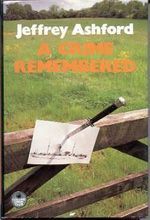 Roderic Jeffries (1926- ) was born in London, the son of writer Graham Montague Jeffries who was known for his series featuring the gentleman crook-sleuth "Blackshirt." Roderic Jeffries didn't immediately follow in his father's footsteps, going to sea at the ripe old age of 17. He later became an attorney, but the lure of writing was too great, and since publishing his first novel in 1951 (taking over the "Blackshirt" character), he's penned over one hundred and sixty novels under his own name and several other pseudonyms, including Peter Alding, Roderic Graeme, Graham Hastings and Jeffrey Ashford, the latest book out this year.
Roderic Jeffries (1926- ) was born in London, the son of writer Graham Montague Jeffries who was known for his series featuring the gentleman crook-sleuth "Blackshirt." Roderic Jeffries didn't immediately follow in his father's footsteps, going to sea at the ripe old age of 17. He later became an attorney, but the lure of writing was too great, and since publishing his first novel in 1951 (taking over the "Blackshirt" character), he's penned over one hundred and sixty novels under his own name and several other pseudonyms, including Peter Alding, Roderic Graeme, Graham Hastings and Jeffrey Ashford, the latest book out this year.
Thirty-six of the author's books featured Enrique Alvarez, police inspector on the island of Mallorca, but he wrote even more titles under his Jeffrey Ashford pen name, including A Crime Remembered from 1987. The plot centers on the Tourkville family, who has owned Highland Place for generations and whose present owner, Edward Pierre Darcy Tourkville, plans on keeping the estate his father almost ruined via neglect and mismanagement. Standing in his way is a sordid seafaring episode from his past during World War II he thought he'd been able to put behind him but now threatens to ruin everything he's built.
Detective-Constable Pete Noyes, a man with no love lost for the privileged upper classes, is assigned to the recent case of a middle-aged homosexual man found murdered, a large stash of bank-notes in his safe that could point to blackmail. With only minimal clues—the name of a town, Glinton, and the initials EPDT—Noyes's investigations take him square into the path of Tourkville. Both Tourkville and the murdered man served on the same ship in the Merchant Marine and were two of only four survivors of the ship's sinking. Hoping to pin the murder on Tourkville, Noyes gradually and grudgingly comes to admire the man, thanks in no small part to Tourkville's devoted wife Charlotte who begs Noyes to clear her husband's name.
As Kirkus Reviews pointed out, Ashford offers something other than a conventional whodunit, part murder-mystery, part psychological study, part police-portrait. The transformation of Noyes is as central to the plot as the murder on one level, or as Kirkus adds, "shrewdly counterpointing Noyes' rocky marriage with the Tourkvilles' sturdy-yet-threatened 40-year relationship." We learn where Noyes self-centered prejudices and tough shell came from, early on:
He despised weakness. Life was about fighting. Fighting the form bully because he couldn't name his father and although one-parent families were said to be fashionable, the form bully had decreed otherwise; fighting the viral infection which had baffled the doctors and specialists and which had, for a mind-numbing time, threatened to leave him paralysed; fighting his way out of a background which seldom let anyone go because most were stupid enough to believe that easy money need not carry a cost..."
As old case and new case intersect and two marriages are put to the test, Ashford skillfully weaves the threads together into a tapestry of regret, redemption and learning to let go of the past.





July 11, 2012
Author R&R with Ben Winters
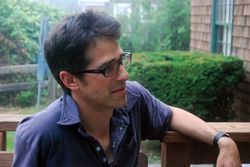 Ben H. Winters joins In Reference to Murder today for a little Author R&R (Reference and Research). Ben is the author of five novels, including the New York Times bestseller Sense and Sensibility and Sea Monsters and the Edgar-nominated YA novel The Secret Life of Ms. Finkleman. His other books include the sci-fi Tolstoy parody Android Karenina, the Finkleman sequel The Mystery of the Missing Everything, and the supernatural thriller Bedbugs, optioned for film by Warner Brothers.
Ben H. Winters joins In Reference to Murder today for a little Author R&R (Reference and Research). Ben is the author of five novels, including the New York Times bestseller Sense and Sensibility and Sea Monsters and the Edgar-nominated YA novel The Secret Life of Ms. Finkleman. His other books include the sci-fi Tolstoy parody Android Karenina, the Finkleman sequel The Mystery of the Missing Everything, and the supernatural thriller Bedbugs, optioned for film by Warner Brothers.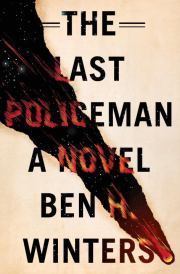 Ben's latest novel is titled The Last Policeman, the first in a trilogy. It offers a mystery set on the brink of an apocalypse and asks the question, "What's the point in solving murders if we're all going to die?" Detective Hank Palace has asked this question ever since asteroid 2011GV1 hovered into view. People all over the world are walking off the job—but not Palace. He's investigating a death by hanging in a city that sees a dozen suicides every week—except this one feels suspicious, and Palace is the only cop who cares.
Ben's latest novel is titled The Last Policeman, the first in a trilogy. It offers a mystery set on the brink of an apocalypse and asks the question, "What's the point in solving murders if we're all going to die?" Detective Hank Palace has asked this question ever since asteroid 2011GV1 hovered into view. People all over the world are walking off the job—but not Palace. He's investigating a death by hanging in a city that sees a dozen suicides every week—except this one feels suspicious, and Palace is the only cop who cares.
But how do you research the apocalypse? Ben offers his take on that:
Quirk Books in Philadelphia is the publisher of my new novel, a murder mystery called The Last Policeman, and they’ve published several of my earlier novels as well. But my relationship with the company started when they hired me to do a series of books extending the franchise of their flagship title, The Worst-Case Scenario Survival Guide. The premise of that very successful book, and its modestly successful sequels by myself and others, was to imagine rare and horrifying situations—like being attacked by a bear or falling from a plane or drowning in quicksand—and offer step-by-step advice, in the dry, practical tone usually used when someone has to reboot their computer or correct a dropped stitch.
Over a few years I wrote everything from The Worst-Case Guide: New York City (How to Survive Falling on the Subway Tracks) to Worst-Case Guide: Meetings (How to Survive Your Boss’s Unfunny Jokes, etc.). And perhaps the most important thing I learned from working on these books (besides the fact that, in a pinch, you can take off your pants and turn them into a floatation device) is the value of interview-based research.
Because at this late point in human civilization, there is so much information available on the internet, immediately and without charge, that the temptation when writing nonfiction is to just grab a bunch of it and stick it in where needed. (Just ask your local high-school student or PhD candidate who’s been bounced for plagiarizing from Wikipedia). But to the conscientious nonfiction writer the value of a one-on-one conversation is immeasurable. Of course you can find a paragraph on the Web somewhere about how to drive a car up a flight of stairs—but tracking down a stunt driver, engaging him in a long conversation, and recording a series of anecdotes about real adventures in the art of stair-driving, will give the finished product a salt and a snap one can never get online.
The point is, having graduated from tongue-in-cheek reference-book writing to fiction, I find myself addicted to this process. For The Last Policeman, a murder mystery set on the brink of apocalypse, I had dozens of one-on-one conversations. I visited a preeminent asteroid-tracking astronomer in his office and basically forced him to give me an intro-level course. I called an acquaintance who is a forensic pathologist and had her walk me through a typical autopsy for the kind of crime my hero investigates. Then I called her back about a thousand times with follow-up questions, significantly revamping the details of my murder to make it track more with reality. I sat in the office of an assistant district attorney in Concord, NH, absorbing not only the details of homicide law, but also the look and feel of the office itself.
And because my novel unfolds in a world of economic collapse, I called economists and economist reporters to chew the fact about the ways my scenario might play out. And the secret is that most people love to talk about what they do and what they know. Imagine that you’re an expert in the concept of insurable interest, a fine point of the insurance business that people at dinner parties aren’t necessarily so intrigued by. Then imagine that a guy calls and says he’s writing a novel, and would you please tell him everything you know? Wouldn’t you be delighted? My expert sure was.
Which is why, after I finish this blog, I’m goings to start calling experts in immigration patterns, because in the sequel to The Last Policeman—well, I don’t want to spoil it. But somewhere out there are very smart people who know things that I need to know—about how and when desperate people move from one place to another—and now I have to find them and call them.
--Ben Winters, July 9, 2012
You can read a Q&A about Ben, his writing and this new novel on the Quirk Books website , and also check out a book trailer for The Last Policeman.





July 10, 2012
Mystery Melange

Book sculpture by Matej Krén.
The Crime Writers Association recently posted some of the winners and longlist nominees in various categories for their annual book awards, but they also announced a special tribute to Colin Dexter. The author will be honored with an Outstanding Contribution to Crime Fiction award for his creation of the unforgettable character Inspector Morse in 13 novels, several stories, and of course the television series starring John Thaw.
Aldo Calcagno noted new stories posted at Powder Burn Flash ("Schoolyard Noir" by Benoît Lelièvre) and Darkest Before the Dawn ("Marathon Date" by Barb Lundy). Calcagno says the two zines are also open for new submissions, with chosen stories targeted for inclusion in late August/early September.
The next Crimezine Noir at the Bar in Culver City, California, features a "a cornucopia of Noir temptresses live on La Cienega." The temptresses in question include Megan Abbott, Denise Hamilton, Christa Faust, Sara Gran, and Jeri Westerson. The fun begins at 8pm on August 5th.
Mike Ripley, a/k/a the Ripster, posted his latest Getting Away with Murder column for Shots Ezine. His always entertaining missives from Across the Pond take on a celebratory flair due to the Queen's Recent Jubilee and the upcoming Olympics, plus many more goodies.
The Q&A roundup this week includes 10 questions for Brian Lindenmuth, editor of Snubnose Press, over at Pulp Curry.
The 2012 conference season is still in high gear, but it's never too late to start making plans for 2013. Left Coast Crime, to be held March 21-24 in Colorado Springs, Colorado, next year, will feature Guests of Honor Craig Johnson and Laura Lippman; Toastmaster David Corbett and "Last Resort" Troubadour, Parnell Hall; Fan Guests of Honor Tom and Enid Schantz; and Ghost of Honor, Stephen J. Cannell. Plus, there are special train and casino side trips.
Dragging your feet on your vacation plans this year? Writing for CNN, Leslie Gilbert Elman looks at five great trips for crime fiction lovers.
It's also not too late for more summer reading (but why just focus on summer, I ask?). The Telegraph enlisted forty authors, including Mark Billingham, John Connolly, Anthony Horowitz, Val McDermid and Peter Robinson for their suggestions of books readers might enjoy.








